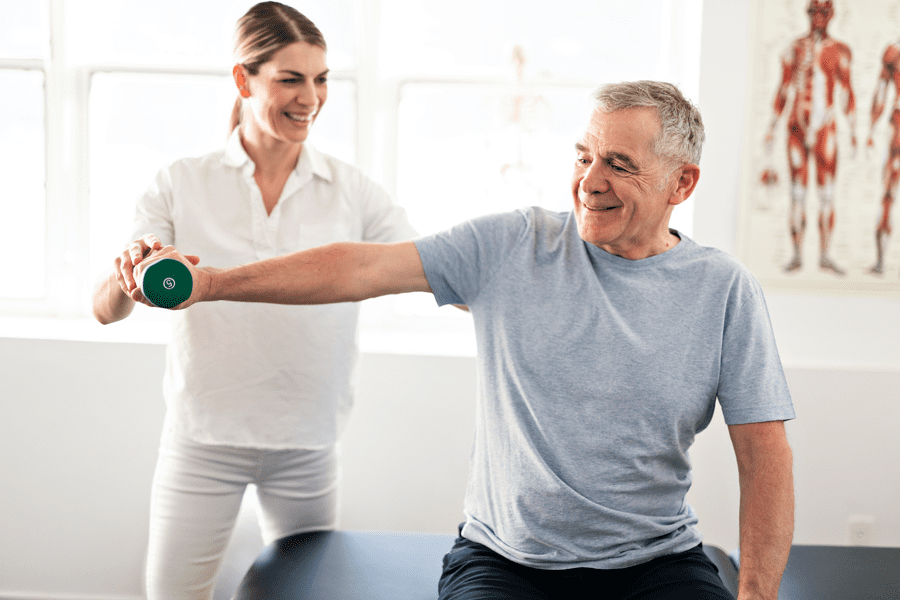Webinar: Physical Therapy and Parkinson’s Panel
With Lee Dibble, Terry Ellis, and Gammon Earhart

THIS WEBINAR WAS RECORDED LIVE ON OCTOBER 26, 2020.
If you’re living with Parkinson’s, a physical therapist (PT) is one of the most important people to have on your care team. A physical therapist can help you improve your balance and reduce your risk for falling, improve your ability to walk faster and further, increase your strength, and improve your overall quality of life.
During this webinar, our panelists discussed:
- The importance of seeing a physical therapist very soon after a Parkinson’s diagnosis
- The importance of aerobic, strength, and balance training when it comes to living well with Parkinson’s
- How physical therapy can help reduce pain and improve overall mobility
- How physical therapy can help with the non-motor symptoms of Parkinson’s
- How to track your progress over time
- New research in the works that may help you live better longer
- Innovative therapies you can try at home
Your Instructors for the Webinar

Gammon M. Earhart, PT, PhD, FAPTA, is a physical therapist and movement scientist. She completed physical therapist training at Arcadia University, earned a PhD in Movement Science from Washington University in St. Louis, and completed a postdoctoral research fellowship at Oregon Health & Science University. Her research focuses on movement control and neurorehabilitation in neurodegenerative conditions, with an emphasis on Parkinson’s. Gammon has published more than 140 peer-reviewed papers, with much of her work supported through grants from the National Institutes of Health. She is past president of the American Physical Therapy Association Section on Research. Her current roles are as Director of the Program in Physical Therapy and Professor of Physical Therapy, Neuroscience and Neurology at Washington University in St. Louis School of Medicine.

Terry Ellis, PhD, PT, is an Associate Professor and Chair of the Department of Physical Therapy & Athletic Training, College of Health & Rehabilitation Sciences, Boston University. Dr. Ellis is also the Director of the Center for Neurorehabilitation at Boston University and the Director of the American Parkinson Disease Association National Rehabilitation Resource Center housed at Boston University. Her research focuses on investigating the impact of exercise and rehabilitation on physical capacity and community mobility in individuals with neurological conditions, including Parkinson’s and stroke. She also has expertise in using mobile health technology to help persons with Parkinson’s to engage in lifelong exercise with the goal of improving overall mobility, community engagement, and quality of life. Dr. Ellis has a PhD in Behavioral Neurosciences from Boston University School of Medicine and is a licensed physical therapist with board certification in Neurologic Physical Therapy. She has published numerous articles and lectures internationally on topics related to rehabilitation, exercise, and mobile health technologies in persons with Parkinson’s.

Lee Dibble, PhD, PT, is a Professor in the Department of Physical Therapy and Athletic Training at the University of Utah. Dr. Dibble has also co-directed the Department of Physical Therapy’s Clinical Operations at the University of Utah and has served on the Utah State Physical Therapy Association Board of Directors and the Utah State Parkinson Disease Association Executive Board. His research focuses on exercise and motor learning counter measures to combat postural instability and balance disorders, and has conducted studies examining eccentric muscle training in mobility limited populations. Dr. Dibble has a PhD in Exercise and Sports Science with a focus on Motor Learning and Motor Control from the University of Utah and is a Certified Athletic Trainer, licensed Physical Therapist, and licensed Athletic trainer. He has published over 70 research articles and has served as an Associate Editor for the Journal of Hand Therapy and as an Associate Editor for the Journal of Neurologic Physical Therapy.




